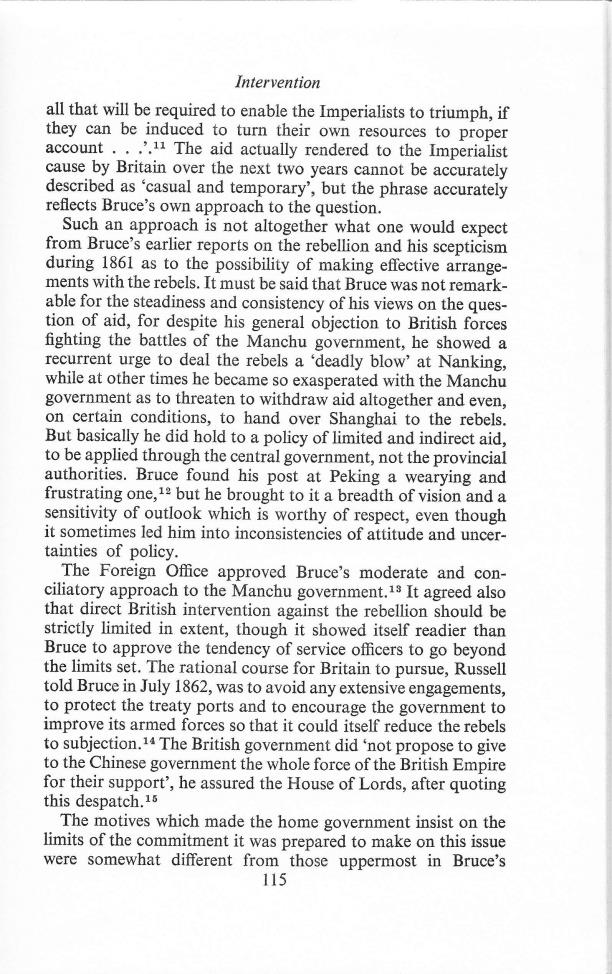正在加载图片...

Intervention all that will be required to enable the Imperialists to triumph,if they can be induced to turn their own resources to proper account...'.1 The aid actually rendered to the Imperialist cause by Britain over the next two years cannot be accurately described as'casual and temporary',but the phrase accurately reflects Bruce's own approach to the question. Such an approach is not altogether what one would expect from Bruce's earlier reports on the rebellion and his scepticism during 1861 as to the possibility of making effective arrange- ments with the rebels.It must be said that Bruce was not remark- able for the steadiness and consistency of his views on the ques- tion of aid,for despite his general objection to British forces fighting the battles of the Manchu government,he showed a recurrent urge to deal the rebels a 'deadly blow'at Nanking, while at other times he became so exasperated with the Manchu government as to threaten to withdraw aid altogether and even, on certain conditions,to hand over Shanghai to the rebels. But basically he did hold to a policy of limited and indirect aid, to be applied through the central government,not the provincial authorities.Bruce found his post at Peking a wearying and frustrating one,1 but he brought to it a breadth of vision and a sensitivity of outlook which is worthy of respect,even though it sometimes led him into inconsistencies of attitude and uncer- tainties of policy. The Foreign Office approved Bruce's moderate and con- ciliatory approach to the Manchu government.1s It agreed also that direct British intervention against the rebellion should be strictly limited in extent,though it showed itself readier than Bruce to approve the tendency of service officers to go beyond the limits set.The rational course for Britain to pursue,Russell told Bruce in July 1862,was to avoid any extensive engagements, to protect the treaty ports and to encourage the government to improve its armed forces so that it could itself reduce the rebels to subjection.14 The British government did 'not propose to give to the Chinese government the whole force of the British Empire for their support',he assured the House of Lords,after quoting this despatch.15 The motives which made the home government insist on the limits of the commitment it was prepared to make on this issue were somewhat different from those uppermost in Bruce's 115r勿 r召 rv纟刀rjo刀 aⅡ that、汛 `i1l be requked to enab1e the Imperia1ists to triumph,r they can be induced 笔0 tum their own resources to proper acoount 。。 '。 1工 :Γhe aid actua11y rendered to the ImperiaⅡ st cause by BⅡtah over the next two years cannot be accurately described as‘ casua1and temporary’ ,but the phrase accurateIy reⅡects Bmcρ ’s Own approach to the question。 Such an approach is not aItogether what one would expect fFOm Bruce’s earⅡer reports on the rebe1Ⅱ on and his scepticism durjhg I861 as to the possibiⅡ ty of1nakhg efFective arrangeˉ ments with the rebeIs。 ItFnust be said that Bruce、vas notren△arkable for thc steadiness and c°nsistency ofhis vie、 vs O11the quesˉ tion of aid,for despite蚯 s gcneral o旬 ecton to British forces fighting the battles of the 卜Ιan0hu govem1△ ent,he showcd a recurrent urge to deal the rebe1sa‘ deadly b1ov'at Nankhg, whⅡe at other tⅡ nes he became so exasperated、 vith the bⅠ anohu government as to threaten to、Ⅳit廴drⅡv aid aItoge伍 er and even, on certain conditions, to hand over Shanghai to the rebels。 But basicaⅡ y he did hold to a poⅡ cy of Ⅱm⒒ed and indirect aid, to be appⅡed through the central governmen△ notthe provinoal authorities, Bruce found his post at Pekji∶I∶】1g a wearyji∶If】 1g and frustrating one,12but he brought to it a breadth of vision and a sensitivity of oudook、Ⅴhich is ll/orthy of respect,even though it somethnes Ied hhn into inconsistenoes of attitude and uncerˉ ta血ties of policy。 The Fore迦羿1 C冫flce approⅤ ed Bruce’s moderate and conˉ cⅡiat。 ry approach to the`Ⅰ anchu goⅤ ernment。 1a It agreed a1so that direct British i11ter、 冫cntion against the rebeIⅡ on shou1d be st蛀ctly Ⅱmited in extent,though it showed itser read始 r than Bruce to approve tlle tendency of service ofF△ cers to go beyond the1iInits set.The rational course for B蛀 tah to pursue,Russe11 told Brucein Ju1y1862,was to aⅤ oid any extensive eRagagements, to protect the treaty ports and to encourage thc government to hmprove its armcd forces so that it couId itser reduce the rebe1s to su凵ec旺on。 1么 The BⅡtish government did‘not propose to giVe to the Chinese governmentthc who1ef° rce ofthe Br⒒ ish Empire for their support’ ,he assured the I-【 ouse of Lords,afCer quoting this despatch,15 The rnotives which made the home government insist on the 1白mits ofthe comm迁 ment it was prepared to make on this issue were somewhat df℃rent ffom those uppermost in Bruce’ s 1I5